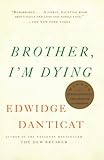Edwidge Danticat was born in Port-au-Prince, Haiti, in 1969. At the age of 12, she moved to Brooklyn, N.Y., where her mother worked in a factory and her father drove a taxi. Danticat’s 16 works of fiction and nonfiction have won numerous awards. She now lives in the Little Haiti neighborhood of Miami, and she will be at the Miami Book Fair with her new collection of short stories, Everything Inside. We caught up with the bestselling author and MacArthur Fellow to talk about her latest book, the Haitian-American experience, and small moments of joy.
The Millions: Haiti is a presence in all of these new stories. Tell me about the pull Haiti exerts on you and your writing.
Edwidge Danticat: Well, everything I’ve written is either about Haiti or about the Haitian-American experience. I still have a lot of family in Haiti, so it’s sort of what interests me as a subject. Also, migration to the U.S. and the Haitian-American community in New York and, in this book, in Miami. A lot of the book is set in the area where I live now.
TM: Do you return to Haiti often?
ED: Yeah, I go back a couple of times a year for weddings, funerals, family gatherings, and book-related things. They have one really famous book festival called Livres en Folie, so I go back for that and for conferences. But mostly for family things.
TM: A lot of the characters’ lives in these new stories have not worked out well. I’m thinking about the woman who’s swindled into paying ransom for the bogus kidnapping of her ex-husband’s wife; the woman with AIDS who gets placebos from a shady doctor; the woman who’s summoned to the bedside of the dying father she never knew, only to find he’s dead when she gets there. Yet these characters seem to find consolations.
ED: Some of the stories are based on the experiences of people I know. Not everybody comes out with a happy ending, you know? And that’s one of the things that interests me—how people deal with difficulties. Maybe I just happen to be a melancholy person. I think also, these days, the experience of poor immigrants is a lot more precarious and terrifying because the rules are always changing. But I hope there are consolations. I think people in very difficult circumstances figure out a way to have moments of joy, you know, moments of appreciation.
 TM: In your memoir, Brother, I’m Dying, you talked about the “generational sacrifice” that a lot of immigrants make so that their children and grandchildren can thrive in a new country. Is that sacrifice still an influence on your work?
TM: In your memoir, Brother, I’m Dying, you talked about the “generational sacrifice” that a lot of immigrants make so that their children and grandchildren can thrive in a new country. Is that sacrifice still an influence on your work?
ED: Oh yeah, absolutely. When I was writing that memoir, my father had just died and my uncle who raised me had died in immigration custody. Both my parents, at the ends of their lives, got terminal diagnoses, so we had a lot of time to reflect. And for both my parents, the marker of success was how their children had done. And they felt a kind of consolation, like you were saying before, in the fact that we were doing okay because they had made these great sacrifices. If things hadn’t worked out, that would’ve been devastating to them. So the fact we were doing okay, we’ve done better financially, we’re in a relationship, we seem happy—that, to them, was proof that everything had been worthwhile.
There’s a sense of forward-looking about it. The people who are traveling with their small children, leaving places because they feel like their children will be in danger, the people arriving in Europe from Syria and other places—I think there’s an element to immigration that is so forward-looking. And then the younger person has the burden of dealing with it, figuring out what to do with it. I’ve spoken to young people who feel like it’s such a big responsibility.
TM: Do you feel that burden yourself as the child of immigrants?
ED: I felt that much more when I was younger. My mom worked in a sweatshop in Manhattan, my father was a taxi driver and also left in the dark and would come back exhausted. I could see the wear and tear on their bodies. And so I always felt like I had to do something to make all of this worthwhile. I wanted to help out as soon as I could, drop out of school. But my parents never allowed that. School was our job. They wanted me to be a doctor, and at times I felt like maybe I should be a doctor to please them. But that didn’t happen.
TM: Well, you turned out pretty well.
ED: Yeah, I did OK.
This piece was produced in partnership with Publishers Weekly and the Miami Book Fair.




